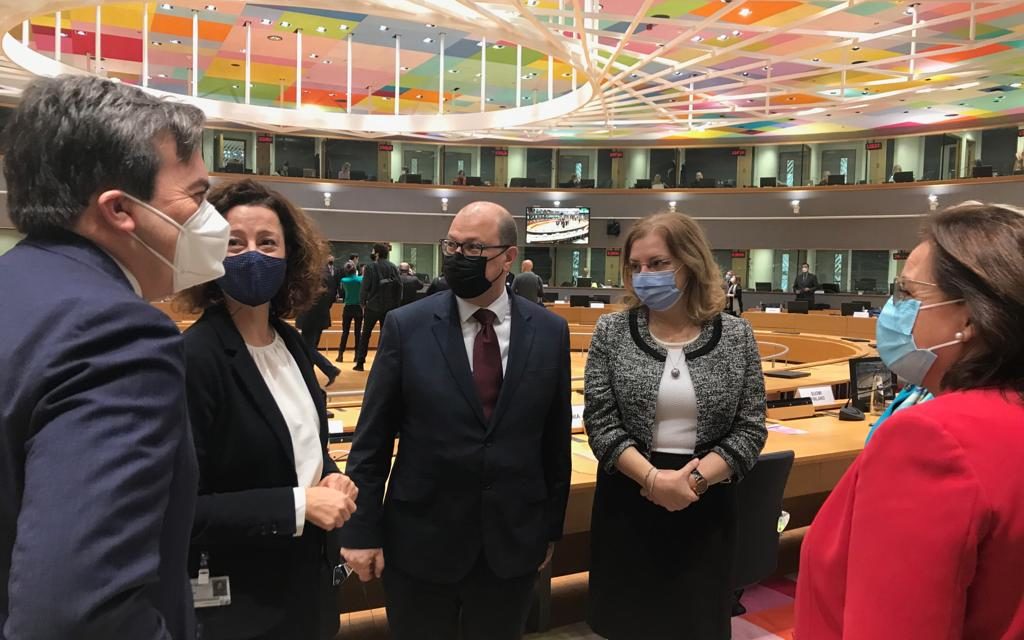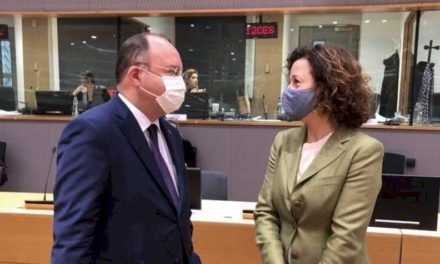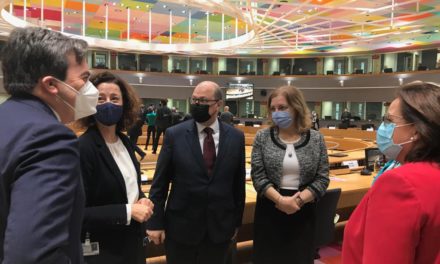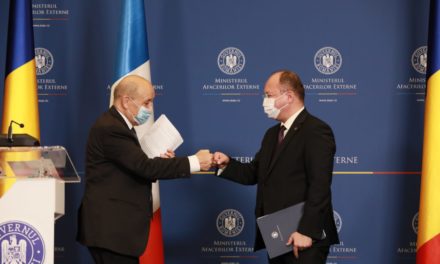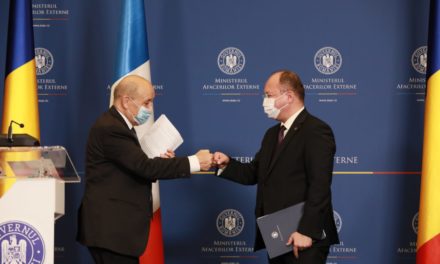Ministrul afacerilor externe Bogdan Aurescu a moderat vineri, 1 iulie 2022, cea de-a doua sesiune a reuniunii “Black Sea Security Summit”, organizată de Comisia Congresului SUA pentru Securitate și Cooperare în Europa (Comisia Helsinki), la Constanța.
Tema sesiunii a vizat relevanța Mării Negre pentru securitatea euroatlantică (“Relevance of the Black Sea to Euro-Atlantic Security”), oferind oportunitatea dezbaterii aprofundate a principalelor evoluții de securitate în regiunea Mării Negre, generate de agresiunea ilegală, nejustificată și premeditată a Federației Ruse împotriva Ucrainei, precum și a măsurilor luate la nivel euroatlantic în ceea ce privește gestionarea acestora.
Intervenția ministrului afacerilor externe Bogdan Aurescu în deschiderea sesiunii este disponibilă, în format video, aici: https://www.mae.ro/node/59043.
Mai multe informații privind co-prezidarea de către ministrul afacerilor externe Bogdan Aurescu, alături de senatorul american Roger Wicker, membru al Congresului SUA, a reuniunii “Black Sea Security Summit”, organizată de Comisia Congresului SUA pentru Securitate și Cooperare în Europa (Comisia Helsinki), sunt disponibile aici: https://www.mae.ro/node/59044.
Transmitem, mai jos, transcrierea intervenției ministrului afacerilor externe Bogdan Aurescu, în deschiderea sesiunii a doua a reuniunii “Black Sea Security Summit”:
It is a great honor to open and moderate the second session of this event, which is dedicated to the relevance of the Black Sea to the Euro-Atlantic security.
But, before that, let me acknowledge the fact that the first session was really interesting and we had a lot of very valid points expressed by the various participants. I think they also covered to a large extent not only the need to respond and the ways to respond to the Russian aggression, which is using the Black Sea as a launchpad, but they have also reflected to a large extent the relevance of the Black Sea for the Euro-Atlantic security.
I think we cannot really make the difference between, on one hand, the need and the ways and means to respond and, on the other hand, the relevance of the Black Sea region.
I think this response – if I can try summarizing a little bit what I have heard – on one hand can be done by maintaining the European and transatlantic unity, which, together with Ukraine’s resistance, as we have heard from our Ukrainian colleagues, has been the major strategic surprise for Russia. Because maintenance of transatlantic unity remains crucial in order to ensure that Russian war ends in a failure for Russia objectives.
Second, I think it’s very important to acknowledge the fact that the challenges in the Black Sea region cannot be met only through cooperation at regional level. It is quite clear that since the effects of the war are not limited to the region, then of course the response should not be limited to regional tools. I use to say that what happens in the Black Sea does not stay in the Black Sea – to the contrary, there are major effects, worldwide.
So our cooperation should continue in a larger framework of the transatlantic Partnership that includes, of course, on one hand, NATO – and we have discussed quite a lot already about the NATO Summit deliverables – but also the EU-US Partnership, regional structures like the Bucharest 9 Format and the Three Seas Initiative and, of course, the bilateral relations between the United States and various other regional Allies and partners including, of course, the Romania-United States Strategic Partnership.
Third, I think it’s also important, in order to respond effectively, to increase the scale and visibility of US presence in the region. I’m talking about, of course, military presence, and I welcome once again the announcements which were made during the NATO Summit.
But it’s not just about the military presence, because I think integrating strategy and action across different mutually influencing areas is very important.
Russia started a war which prompted a security crisis, but at the same time we have witnessed an energy crisis, an economic crisis, a social crisis, a humanitarian crisis, and a food crisis. So there are a lot of dimensions. That means that our response should be also cross-cutting, covering the whole spectrum. We are not only speaking about a response which is limited to the security response, which is very important and we have to continue to support Ukraine with all means we have available in that respect, but also we have to respond together to the other effects of this crisis, which I have just mentioned.
Of course, when we are talking about this, we have to also take into account the risks and threats arising from corruption, from authoritarianism, from illiberalism, from disinformation, fake news and other disruptive forces.
Last but not least, we need to take a look at the larger picture, not just the littoral states or riparian states, but also other countries from this region which are very much connected and dependent to what happens in the Black Sea – I’m talking about the Republic of Moldova, for instance, which deserves and needs our support, and I’m very glad once again to stress the fact that the decision of the European Council to grant candidate status to Ukraine, but also to the Republic of Moldova, and to also acknowledge Georgia’s European perspective, was a historic decision, as well.
So we are speaking about historic decisions taken not just by NATO, during the NATO Summit, but also by the European Union.
So, now, if we are talking about all these dimensions, let me mention the US Black Sea Strategy, because we have heard about the preparations of this Black Sea Strategy for quite some time. I was discussing with Secretary Blinken last November, when I visited Washington, about the Black Sea Strategy of the United States and I have conveyed Romania’s preliminary thoughts, which were quite consistent, on that.
We are advocating for a multifaceted strategy based on strategic resilience covering a lot of areas, going beyond the military domain to encompass economic and democratic resilience and we have seen that what Russia has started is just a confirmation. Because of the multifaceted effects we need multifaceted responses, so we support a United States Black Sea Strategy covering more aspects than just the military domain.
For instance, we have been advocated for quite some time for two very important projects in the framework of the Three Seas Initiative, which are called Rail2Sea and Via Carpathia. Rail2Sea is a speed railway connecting Constanța to Gdansk, in Poland, which is very relevant for the economic development of this Three Seas Initiative, but also for military mobility. If we are to move rapidly forces and equipment on the Eastern Flank, we need such kind of tools. Via Carpathia is a road connecting betleem the North and the South of this region of Central Europe, which we also call the “Three Seas Region”. So, it’s important that, for instance, the United States takes into account the support for these projects which are strategically interconnecting the North and the South of this region, including by financial means.
I will not continue with my intervention, but I would like to give the floor to colleagues to continue their very interesting presentations and the first on my list is Representative Richard Hudson, so, Sir, you have you have the floor.

